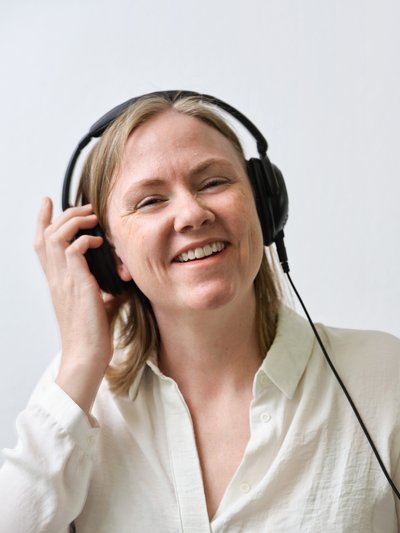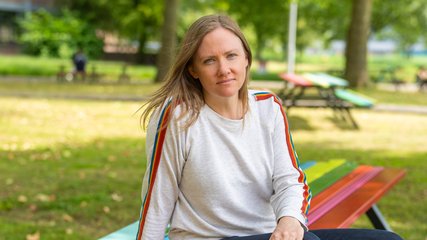Stacey Jeffery travelled halfway around the world to discover where her heart truly lay. It turned out to be in Amsterdam, in the world of quantum computing. As a professor by special appointment of quantum information, she finds the field fascinating. But she’s also struck by how few women work in quantum science in Europe. To address this issue, she established a professional network for women.
‘Quantum computing was the coolest subject I’d ever studied’
Her inspiring journey brought Stacey Jeffery (CWI, QuSoft, University of Amsterdam) from Canada via China to Amsterdam. In an interview with NWO's Onderzoek Magazine she reflects on her research in quantum algorithms, and her efforts to promote inclusivity in the quantum technology field.
Music as a metaphor
Stacey Jeffery likes to use music as a metaphor for her field of research: quantum computing. ‘The foundation of a song is the beat,’ she says. ‘But to make music, you need more than just a beat. You also need a melody that carries more complex information about the intended emotion. That reminds me of a quantum calculation.’ A few years ago, she brought this metaphor to life at the Gala van de Wetenschap, performing live on stage with musician Spinvis and her colleagues Harry Buhrman and Maris Ozols. ‘It was great fun,’ she says, laughing. ‘I’d love to explain science this way more often.’
Jeffery has been passionate about singing since childhood and has been a backing singer in various bands. She grew up near Toronto in Canada, where her father died of a brain haemorrhage in his sleep when she was just four months old. Following his premature death, Jeffery’s mother was left to raise young Stacey and her brother, who was two years older. ‘My mother didn’t have it easy. Even before my father died, she had already given up her studies to take care of us. We lived on welfare for a long time. Fortunately, we had a close-knit network of supportive grandparents and friends around us. My mother was also incredibly loving and encouraging. She always told me that I could achieve anything I wanted when I grew up. Still, I was troubled by the sense that we were poor. I felt that some people looked down on our family, that we weren’t fully accepted in our community.’

ERC grant for quantum research
Stacey Jeffery received an ERC Starting Grant for research into algorithms, security and complexity for quantum computers (ASC-Q). Quantum computers use quantum bits – the smallest unit that exists – to solve complex problems instead of the binary system of zeros and ones. Jeffery’s research focuses on what quantum computers can be used for. In the ERC project, she is designing new quantum algorithms for quantum computers with limited memory.
The feeling of not belonging haunted Jeffery for a long time. ‘During the first years of my academic career, I often thought, “People will find out that I don’t belong here.”’ However, it was clear that Jeffery belonged at university. She was a smart, curious child who devoured books. ‘My mother went back to university when my brother and I were a bit older. She sometimes took me to her sociology lectures. There I was, a nine-year-old enthusiastically writing and drawing. She told me that her fellow students, who had missed the lectures, were very grateful for my notes. And I believed her.’
Growing up in China
Jeffery liked maths, so when the time came, she chose to study a combination of mathematics and philosophy. But the experience turned out to be disappointing. ‘I walked out of my first maths lecture feeling confused. It felt like a repeat of what I’d already done in secondary school,’ says Jeffery. ‘And philosophy wasn’t about the origins of the universe, as I had hoped. I quickly lost interest in studying.’
Jeffery decided to take a break and left for China with her boyfriend at the time to teach English. ‘We lived there for a year and a half, first in Shandong and then in Beijing. It was a defining experience. I really grew up there. First, because I was confronted with a completely different culture. And second, I went there incredibly naïve. For example, I hadn’t even arranged health insurance. I also wasn’t prepared for the fact that, in China, my boyfriend and I were considered relatively “rich”. We could go out, take taxis and buy all sorts of things.'
'The Chinese high school students I taught told me they dreamed of studying in Canada one day. This made me realise how privileged I had been in Canada. I hadn’t taken university seriously – I’d simply taken it for granted. These young people would give anything for such an opportunity. It really humbled me.’
Stacey Jeffery:
For every four men, there’s only one woman working in the quantum sector in the European Union.
Coolest subject
Jeffery returned to Canada, determined to take her studies more seriously. She also brought something back from China: a copy of Gödel, Escher, Bach by Douglas Hofstadter, which she had found in an English bookshop in Beijing. ‘It was a real eye-opener,’ she says. ‘It was about logic, music and how the brain works. The common thread was theoretical computer science. That book made me decide to switch to computer science.’ She was surprised when her mother told her that, at the time of his death, her father had also been studying this subject. ‘I didn’t know that. It was very moving to realise I had, unknowingly, followed in his footsteps.’
But once again, Jeffery was disappointed during her first semester because she didn’t feel challenged enough. This time, she asked her professor for help. ‘Take the quantum computing course,’ he suggested. Jeffery: ‘That turned out to be spot on. Quantum computing was the coolest subject I’d ever studied. It’s fascinating to discover that the universe doesn’t work the way you think it does. I was so excited that I asked the professor if I could be his research assistant.’
Fast forward to 2017: Jeffery is now a postdoc at Caltech in California, looking for a job. She applies to QuSoft, a quantum software research centre founded by the Research institute for mathematics & computer science in the Netherlands (CWI) and the University of Amsterdam. ‘CWI is world-renowned in quantum computing, so I really wanted to work here.’ The move to the Netherlands went smoothly, with no major culture shock. ‘My colleagues are great. We have a warm, supportive atmosphere at CWI. And Dutch society is quite open, which makes it easier to step outside your usual “social bubble”.’
Making the field more inclusive
Jeffery has observed that women remain underrepresented in quantum computing. To help change that, in 2019 she co-founded a professional network for women in the field with Julia Cramer from Leiden University: Women in Quantum Development (WIQD). ‘For every four men, there’s only one woman working in the quantum sector in the European Union. With WIQD, we bring women and other underrepresented groups in quantum technology together and try to make the field as inclusive as possible.’
This is urgently needed, says Jeffery: ‘At the University of Waterloo, where I studied, I was part of a large group and always had several women around me in my field of research. But when you’re the only woman, it can be tough. You have no one to look up to. I’ve seen several women drop out for that reason. On several occasions, I’ve had men tell me I was only offered a position because I’m a woman. Even though I know rationally that I’m a capable scientist, comments like that still get to me.’
About Stacey Jeffery
- 1985 Born Guelph, Canada, raised in Acton, Canada
- 2004 – 2005 Philosophy and mathematics, McMaster University, Canada
- 2005 – 2006 English teacher in China
- 2007 – 2009 Bachelor’s degree in mathematics and computer science, University of Waterloo, Canada
- 2009 – 2011 Master’s degree in mathematics (combinatorics and optimization), University of Waterloo
- 2011 – 2014 PhD computer science, University of Waterloo
- 2014 – 2016 Postdoc at California Institute of Technology
- 2017 Veni grant for research ‘Harnessing the Power of Near-future Quantum Computers’
- 2017 – Currently researcher at the Algorithms and Complexity Group, CWI Amsterdam & QuSoft
- 2019 Founder of WIQD 2023 network – currently part-time professor by special appointment of quantum information, University of Amsterdam
Stacey Jeffery lives in Amsterdam with her husband and two daughters (two and five years old)

Author: Elke Veldkamp
This interview was published in NWO's Onderzoek Magazine.
Header picture and lower picture by Ivar Pel (2024).
